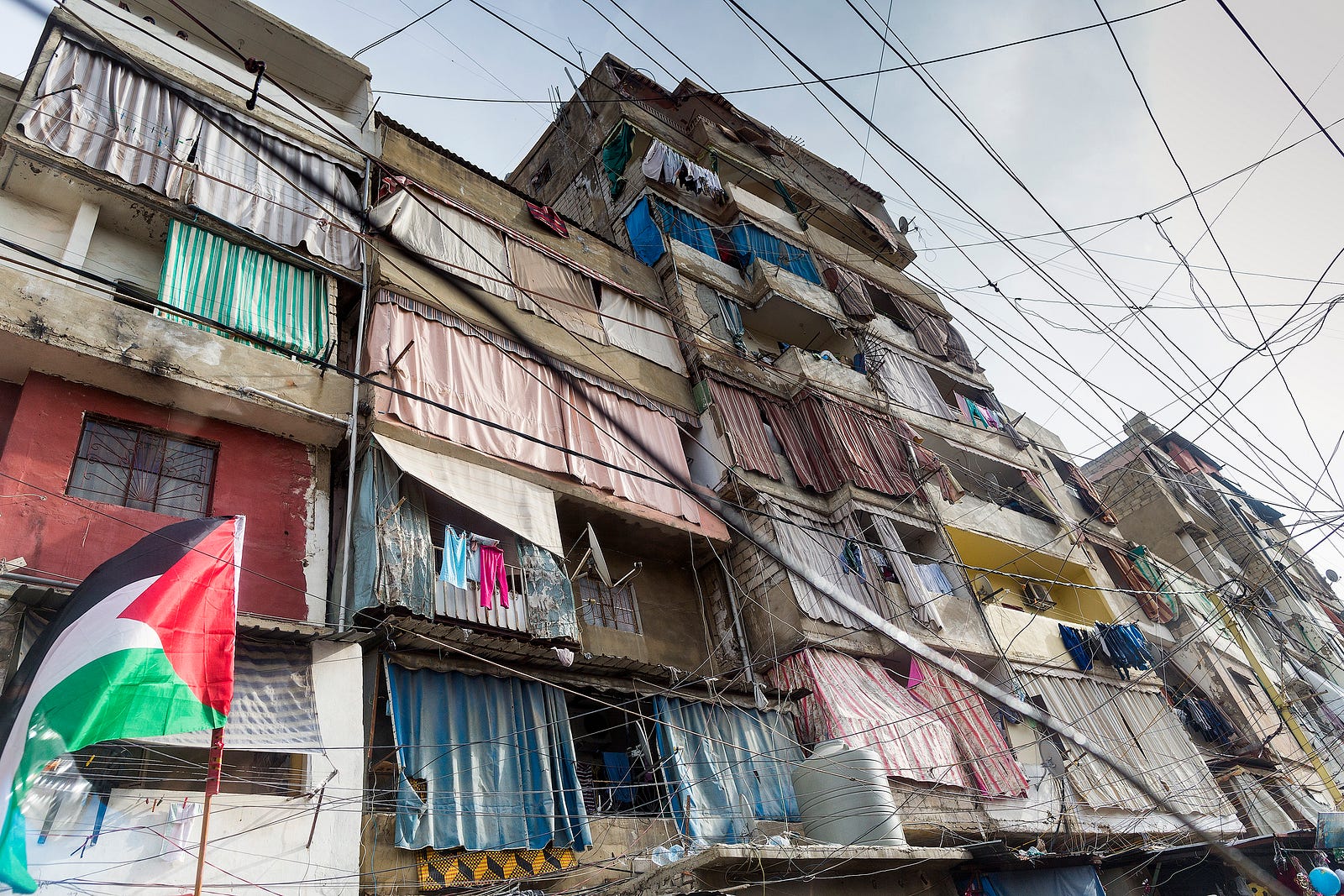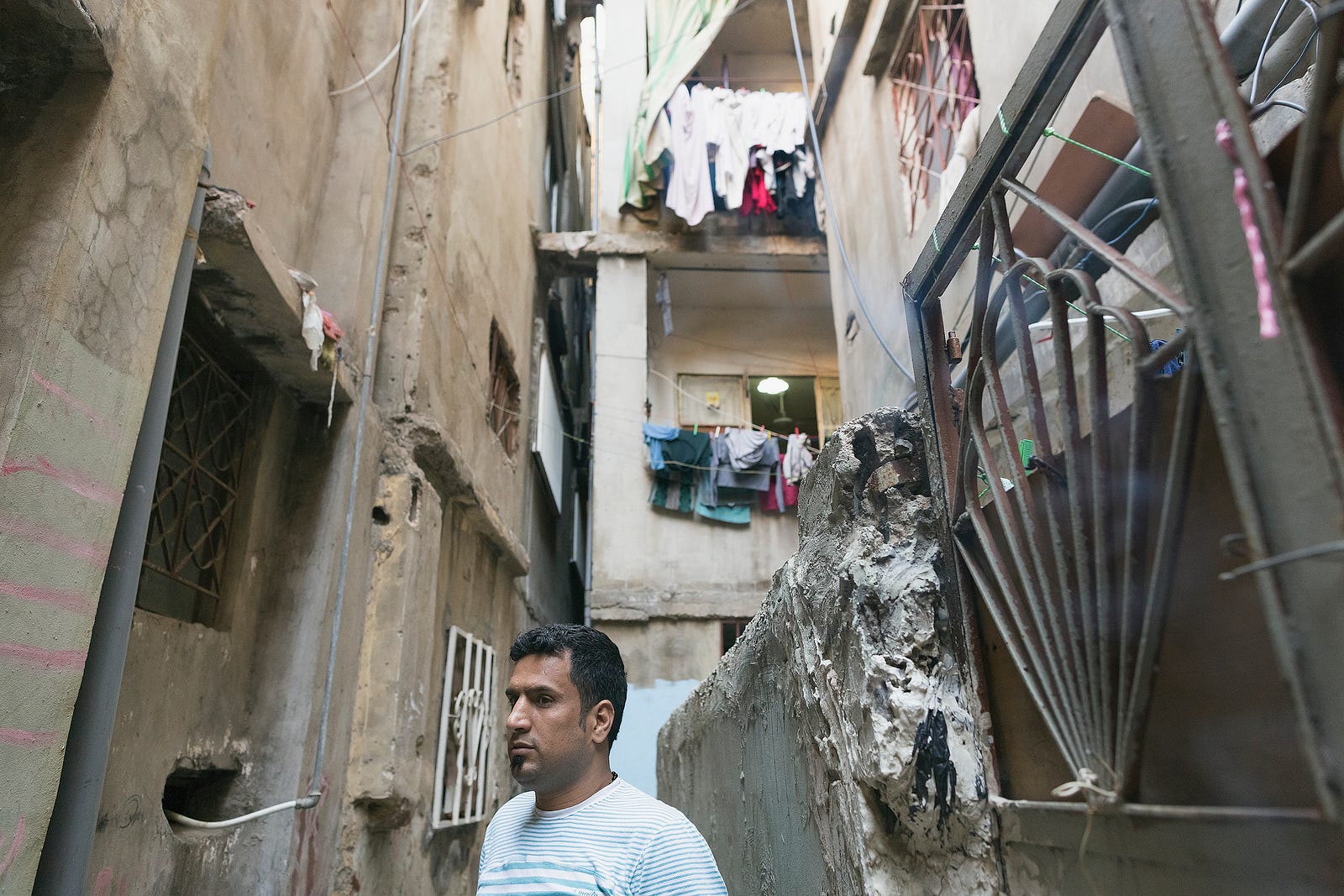Islam: The World's Refugee Source
"Our nationality is a curse. It's just a source of pain for us and our children."
"When we first came [to the Shatila refugee camp in Beirut administered by UNRWA; the United Nations Relief and Works Agency for Palestinian Refugees in the Near East], on the first night, I cried. It's like a graveyard."
"We had a good life [in the Yarmouk camp for Palestinians in Syria]. All my friends are Syrians. They used to treat us as Syrians, and we used to treat them as Palestinians."
Wadad Jomah, Shatila Refugee Camp, Beirut, Lebanon
"It doesn't mean anything to me [of her status as a Palestinian]. I'm dying because of Palestine. If someone asked me to switch nationalities, I would."
Iman Abd-Alkarim, Shatila Refugee Camp, Beirut, Lebanon
 |
| In Lebanon, Palestinian refugee
camps — like Shatila — are isolated communities, alienated from their
surroundings. More than 60 percent of Palestinians live below the
poverty line. Cramped into the notoriously lawless camps, they’re banned
from all but the most menial professions and barred from owning
property. MoMA |
Clearly, these women -- whose parents and grandparents were among the thousands of Palestinians who fled when Israel defended itself during its 1948 war of independence, a war forced upon Israel when it declared itself a newborn state once the United Nations declared its legality with the plan for Partition, leaving Palestine divided between Israel and the Palestinians, an opportunity that Israel seized and the Palestinians refused considering all the land theirs and theirs alone -- would prefer not to be refugees.
The United Nations, in its great wisdom, responded by forming a refugee relief agency dedicated solely to the support and upkeep of the estimated 750,000 Palestinians who fled to find temporary refuge in neighbouring Arab countries until such time when they could return, on the destruction of Israel, in roughly several weeks, a month at most. They and their descendants, who now number around six million, have been designated refugees for whom the United Nations deems themselves responsible.
And those Palestinians in their aggravated, aggregated numbers continue to nurse their victimhood grievances, plotting to destroy Israel and regain what they feel they had lost during the tragedy of the Naqba ("Disaster") ever since, mounting one violent attack after another on the Jewish state and its citizens. They have graduated from merely denouncing Israel as an illegal 'apartheid' occupying force in "Palestine" to slandering it through a global public relations campaign portraying themselves as victims and Jews as oppressors bent on Palestinian genocide even while viciously violent attacks on Israelis and Jews there and abroad have become commonplace.
When the Palestinians dispersed, calling themselves victimized refugees, and seeking shelter in neighbouring states, none of those Arab nations saw fit to absorb their Arab brethren and give them status as citizens, save Jordan which is itself comprised of three-quarters Jordanian Palestinians since Jordan itself was created by the British during its colonization of the area, out of land meant to be apportioned to Israel.
 |
| Adnan, a young father sitting on the ledge waiting for a job opportunity, “The lives we established in Syria became our home.” He spoke about Yarmouk, about the war and destruction, and he was hopeful that someday he might return to Syria. “I do not wish to live in Lebanon,” said Adnan. Before the war he had a nice apartment, a decent job, and a safe place to raise his children. The war in Syria has torn his family apart, and he now lives in Shatila — without his family. His home and business was destroyed when Yarmouk turned into a battlefield. He lost everything. Unable to provide for his young family, his wife took the children to live with her parents in Iraq. Adnan was distraught about the separation from his family, and he hasn’t spoken to his children in months. MoMA |
In the Syrian Yarmouk refugee camp administered by UNRWA, Wadad Jomah and her husband had a large two-story home with many windows of which they were proud; all lost now when the camp became a scene of conflict between rebel militias in Syria and the Popular Front for the Liberation of Palestine General Command whose backing of Syrian President Bashar al-Assad destroyed the peace of the 'refugee camp' which was such in name only. Her husband had been a production manager in a medical supplies factory.
That the PFLP, a terrorist offshoot of Fatah, the leading Palestinian Authority party, finds common cause with a murdering tyrant is hardly surprising tough the former is mostly Sunni and the latter Shiite. Opposition groups accusing some of Wadad's relatives of collaboration with the Syrian regime, executed them. When another relative who fought with Jabhat alNusra, an alQaeda affiliate was arrested by government forces as he attempted to enter the camp to see his children, he was imprisoned and died there.
The unrest and the danger led Wadad and her husband Hussein Jomah to leave Yarmouk three years ago, for the very same reason that most Syrian Sunnis left Syria. They resisted continuing to be living targets for the regime's chemical attacks, starvation siege strategies and barrel bombs, which destroyed the civil infrastructure they called home and killed the people they called their relatives. When they arrived in Lebanon, to the Palestinian refugee camp of Shatila they found a warren of rickety concrete, narrow alleyways and squalid conditions.
Yarmouk, now, is in the hands of the Islamic State, and residents there continue to starve to death. The refugees now in Lebanon's Shatila camp recall their lives in Yarmouk before the civil war and mourn, just as their parents and grandparents recalled their lives in Israel before they fled, and mourned. "I can't live here anymore. I cry every night. I just want one room and a school for my son", wept pregnant Iman.
 |
| The infrastructure in the Shatila refugee camp is in a catastrophic state of repair. Above the narrow streets hangs a tangle of high-voltage cables that sometimes carry no power for up to 16 hours a day. The camp is hopelessly overcrowded, which means that residents are forced to build new residential complexes on top of existing buildings. From time to time, entire buildings collapse under the strain. Quantara.de |
Labels: Atrocities, Civil War, Lebanon, Palestinians, Refugees, Syria

<< Home